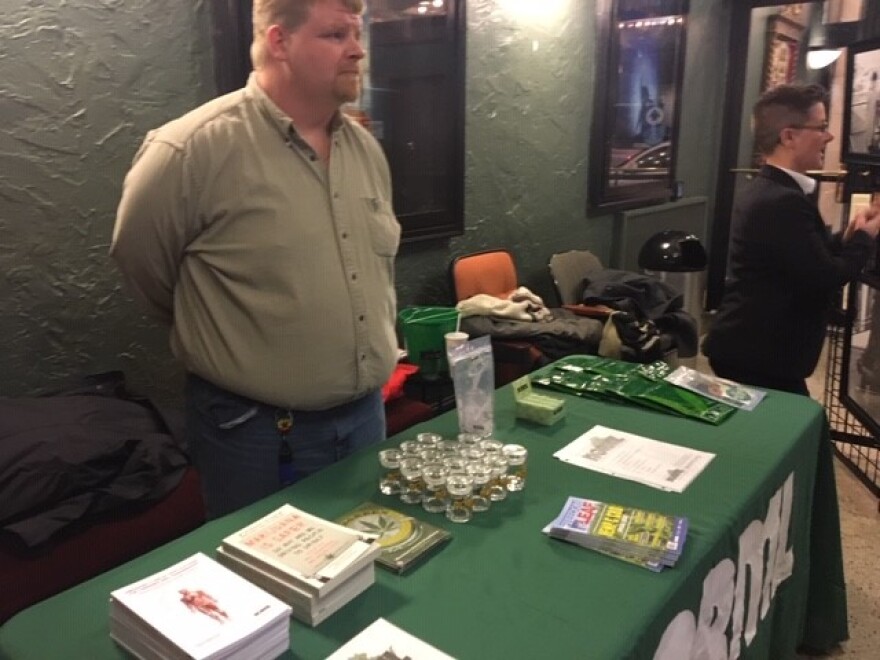More than 30 US states, as well as Washington DC, now have laws on the books that permit some sort of medical cannabis treatment. That includes Virginia, where lawmakers chose to expand the program - before the first product is even developed.
It’s been a couple years since state lawmakers approved plans to open five pharmaceutical processing centers. All will produce cannabis oil, benefitting patients with CBD, or cannabidoil, and THC, the main chemicals used in the medicine.
But it took a while to expand treatment to conditions other than epilepsy. Just this spring, the General Assembly decided on higher dosage limits - and allowed it in different forms, like capsules, sprays, patches, and lollipops.
“If you know anything about multiple sclerosis, it’s different every day, the morning than it is in the afternoon, " says Tamara Netzel, a hopeful patient from Alexandria. "I’m very excited about Virginia taking these steps, learning as they go. We have the advantage of actually looking at the programs- what has worked and what hasn’t worked in other states.”
The last couple of years, Netzel has had to break federal law, bringing back cannabis products across state lines.
But with a doctor’s recommendation, and valid registration from the State Board of Pharmacy, she should be able buy it in Manassas, the location of one of those first five producers of medical cannabis oil.
After a rigorous application process, the Board selected one dispensary for each of Virginia’s five health service areas. The others will be in Bristol, Staunton, Richmond, and Portsmouth.

State Sen. Siobhan Dunnavant suggests as many as 100,000 Virginians could benefit from those sites, but is anxious to actually see the statistics.
“We want to make sure that we tiptoe into this, (and) make sure there are no bad outcomes, or criminal activity," said the Republican lawmaker and Henrico County physician, who sponsored SB 1557, the measure setting dosage amounts and formulations of cannabis oil.
But Dunnavant says the program needs concrete evidence before more laws can be passed.
"We may need more dispensing areas, there’s an enormous amount of talk about that," she said. "But I just don’t think we know, until we get up and running, and I’m just so afraid that the more we tweak the program before it actually even exists, the more threatened it is to just be a victim of so much regulation and hypothesis."
Other measures that saw bipartisan support, and were recently signed by Gov. Ralph Northam, will let someone other than a patient serve as a ‘registered agent’ (SB 1719, sponsored by Sen. David Marsden, D-Burke) and deliver medical cannabis products to patients who can’t get it themselves, like nursing home residents. Two other identical measures (HB 1720, SB1632) will let school nurses administer treatments to children at school. They were sponsored by Del. Chris Hurst (D-Blacksburg), and Sen. Glen Sturtevant (R-Richmond.) Advocates also note that these products should not be confused CBD derived from hemp.
Another physician says Virginia’s education campaign needs to ramp up - particularly, for other doctors, and major hospitals. Travis Shaw, a plastic surgeon in Richmond, researched medical cannabis for his young daughter, when she was diagnosed with a form of epilepsy.
“I’ve spoken here with VCU, Bon Secour, and the HCA – which are the big three hospital here in the Richmond area, and none of them have any kind of policy in terms of place for their physicians in terms of recommendation for medical cannabis," he said.

Another hopeful patient, Scott St. Clair of Roanoke, has a hip condition, and used to rely on opioids to deal with the pain.
But he says that led to depression, and anxiety issues, and like Netzel, now relies on medical cannabis from outside Virginia.
“I decided to give up the opioids, and I’m able to do things with my children, go to the park, and do other things," said St. Clair, who also assists with operations at Virginia NORML (The National Organization for the Reform of Marijuana Laws.) "I wouldn’t be able to if it wasn’t for self-medication."
Advocates say the program needs more dispensaries than those opening in 2019 – which could include more sites to develop medicine that separate from where the cannabis is grown. Virginia NORML Executive Director Jenn Michelle Pedini says five facilities aren't sufficient to sustain the entire population of the state.
"The next steps from a public policy standpoint are to shift to a state legal model that allows for tiered licensing - like production licenses, and retail licenses- while incorporating the existing vertical licenses," Pedini said. "These steps would be consistent with the best practices currently in place in the 33 U.S. states and multiple U.S. territories currently regulating cannabis for medical and or adult-use."
Delegate Chris Hurst expects those changes fairly soon.
“I don’t think that these five are going to be the only five for very long," he said. "It doesn’t seem to be to be the right way to go about it – if demand is there. If demand is there, and the access issues still remain, then we’re going to need to re-evaluate how distribution is done.”
Virginia’s first five medical cannabis dispensaries are expected to open by September.


